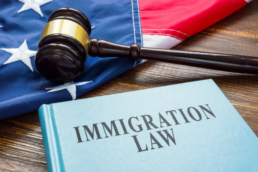Beginning March 4, 2013, U.S. Citizenship and Immigration Services (USCIS) will start to accept the new provisional unlawful presence waiver of immediate relatives of U.S. Citizens (USC) stateside.
Under the new rule immediate relatives (spouse, children under 21, and parents only) of USCs who have been unlawfully present in the U.S. may file this provisional waiver before departing the U.S. and returning to their home country to attend their Immigrant Visa interview.
This new rule is aimed at further establishing family unity. Previously, those who were unlawfully present in the U.S. were required to depart the U.S. and file the waiver application while in their home country. This often resulted in a separation from their USC relative that could last many years. This new rule will significantly reduce the amount of times of that separation.
Under the current rule (which will still be available to those who do not qualify for the new process) applicants who are not eligible for Adjustment of Status because they have accrued more than 6 months of unlawful presence, must leave the U.S. to obtain their Immigrant Visa abroad. They must also obtain a waiver to overcome the unlawful presence inadmissibility bar before returning to the U.S. This waiver was filed after departing the U.S. It is important to note that even if you are a Canadian or Mexican citizen and you have been in the U.S. for more than 6 months without valid status, you may be subject to the unlawful presence inadmissibility bar.
However, starting on March 4, 2013 those applicants needing a waiver can complete that process stateside and receive a provisional decision before returning abroad. To be eligible to apply for the new provisional stateside unlawful presence waiver the applicant must:
- be an immediate relative of a USC;
- be inadmissible ONLY because of unlawful presence; and
- demonstrate extreme hardship to the USC (not to the applicant). Extreme hardship factors include: medical, economic, and current foreign country conditions.
If the applicant meets those requirements, they should file the new Form I-601A with USCIS before departing the U.S. The applicant will still have to leave the U.S. to attend their Immigrant Visa interview, but the time outside the U.S. will be significantly reduced. The applicant will also have to notify the National Visa Center of their intention of seeking the provisional waiver from USCIS.
If you are interested in more information about the stateside waiver, please contact our Attorneys today!
Ready to have Berardi on your side?
Whether you’re a business looking to hire or a professional hoping to relocate, immigration law can be complicated. But you don’t have to do it alone. Put our experience to work for you.


